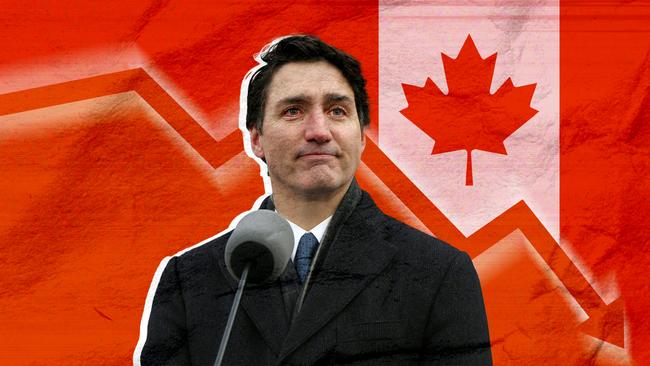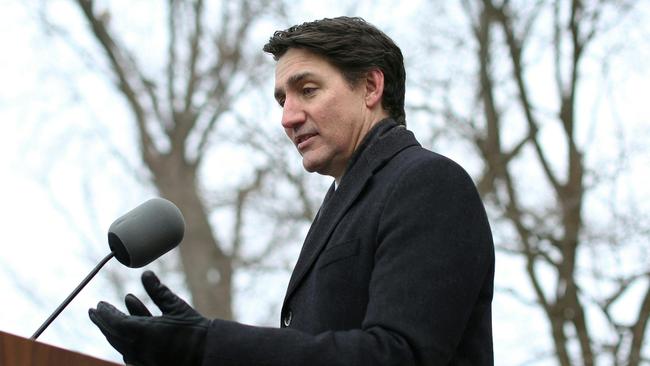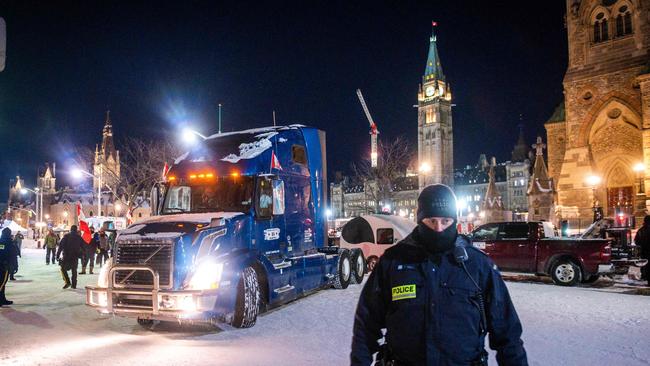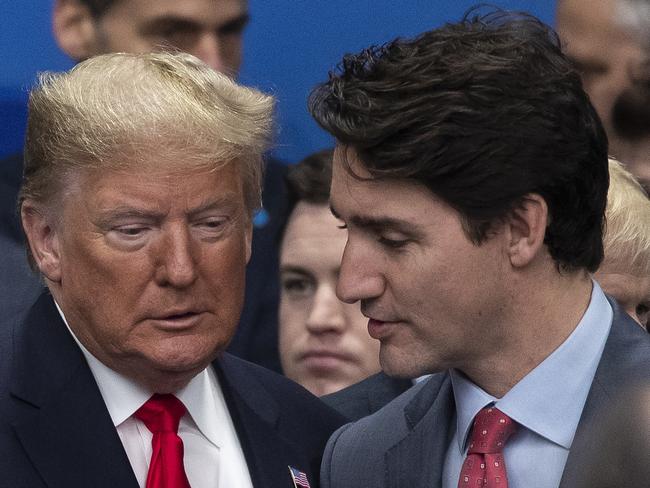The comprehensive failure of Justin Trudeau
Justin Trudeau’s policies and bad ideas transformed Canada into the sick man of North America. Though he is the latest casualty of the great crack-up, he will not be the last.

In the nine years since he became Canada’s Prime Minister, Justin Trudeau has been hailed not only as the saviour of the country’s Liberal Party but more broadly as the glamorous beacon of Western liberalism. Or so it was until Monday when, in front of his official residence in Ottawa, Trudeau announced he would be stepping down once a new leader was selected. The question is, what happened – and who’s to blame?
To hear Trudeau tell it, the problem is squabbling within the ranks of his own Liberal-led minority government. “If I’m having to fight internal battles,” he said on Monday. “I cannot be the best option in that election.” And to be sure, the precipitating event for this crisis was last month’s surprise resignation of Chrystia Freeland, Trudeau’s top deputy and finance minister. But the problem with Trudeau’s government is not the name at the top of the ticket. The problem is bad ideas, strongly held.

Trudeau may think of himself as a liberal, and that may even be the name of his party, but his government actually epitomises illiberal progressivism. Wedded to policies rooted in bien-pensant concerns while neglecting the Canadian public’s everyday challenges, Trudeau has presided over Canada’s deterioration into the sick man of North America. Canada has long been a haven for those hoping to escape dictatorships and civil wars for a stable democracy, but the situation has become so bad that some Canadians have left for the US.
Consider the following:
Economy
Trudeau is deeply unpopular – according to an Ipsos poll from last month, 73 per cent of Canadians, including 43 per cent of Liberal voters, believed Trudeau should step down as party leader.
Perhaps no issue drives that more than the economy. In her resignation letter, Freeland called out Trudeau’s “costly political gimmicks”, a reference to his $C6.3bn ($7bn) affordability plan that included sending $C250 cheques to everyone in the country making less than $C150,000 a year. Canada’s government, once a model of fiscal prudence, now runs massive deficits to fund increasingly ineffective social programs.
Trudeau’s runaway taxing and spending have made Canadians poorer, in part due to his signature carbon tax, which has reduced real incomes across the country. Before the pandemic, Canada’s per capita GDP was about 80 per cent of America’s. In 2025 it will be just 70 per cent, according to International Monetary Fund projections.
Donald Trump jokes that Canada should become a state, but if it somehow became one it would be among the poorest in the union.
This has left behind a generation of young voters who are fleeing the Liberals and heading for Pierre Poilievre’s increasingly feisty and populist Conservatives. Polls indicate the Conservatives would win a commanding majority in parliament if an election were held today.
Immigration
Canada has long welcomed immigrants. Yet for the first time in 25 years most Canadians say immigration levels are too high. “The 1.1 million new immigrants who came to the country in 2022 alone drove unprecedented competition for jobs,” the head of Canada’s leading youth employment agency said recently. “We are seeing some of the highest youth unemployment since 2012 in a matter of a year and a half.”
Among these immigrants are some individuals who do not share Canada’s values of tolerance and pluralism. This, in turn, has helped feed an explosion of anti-Semitism. (More on that below.)
Crime
Violent crime has skyrocketed under Trudeau’s leadership. Homicides rose by more than 50 per cent between 2014 and 2022, and on a per capita basis there is now more violent crime there than in the US. This, again, is a direct result of Trudeau’s policies, which have increasingly gone easy on criminals, even explicitly giving lighter sentences to people of colour who’ve been convicted of crimes. It’s an astounding turnaround for a country that long kept serious violence confined to ice hockey rinks and subarctic bars.
Truckers
In 2022, protesters – many of them truckers irked by vaccine requirements mandated for travelling between Canada and the US – travelled to Ottawa to voice their opposition to policies that were making their country less prosperous and less free. It wasn’t that the truckers, admittedly engaged in the aggressive tactic of blockading the capital’s streets, were wholeheartedly anti-vax (as reported at the time, “the vast majority” were vaccinated). It was that, under Trudeau, they were distressed at what was happening to the country they loved.

Trudeau dismissed the protesters as “a few thousand people shouting and waving swastikas”. He invoked emergency powers never deployed in Canadian history to rob protesters of their access to banks, freezing accounts and suspending credit cards. It was a deeply illiberal response to a peaceful protest by fed-up citizens, many of them immigrants themselves. (In 2024, a Canadian judge ruled that Trudeau’s actions were unconstitutional.)
“We came to Canada to be free – not slaves,” one Ukrainian immigrant who joined the protests said at the time. “We lived under communism and in Canada we’re now fighting for our freedom.”
Censorship
Under the guise of combating disinformation (a term, as always, vaguely defined), Trudeau’s government has cracked down on what news Canadians are allowed to consume. Canada’s Online News Act was sold as a way to make social media companies pay news organisations when linking to their content, but in reality it was a sop to legacy media and has resulted in a ban by Meta on the sharing of news content on social media.
Rise of assisted suicide
Under Trudeau, medically assisted suicide has become alarmingly popular. In some provinces in 2023 nearly 5 per cent of Canadians died this way. The explosion of the procedure’s popularity is due in large part to how lax Canadians have become in selecting who can die this way – all a Canadian needs to show is that they suffer from an ailment “intolerable to them” and that can’t “be relieved under conditions that they consider acceptable”. (Thankfully, parliament decided in 2024 to postpone extending the treatment to those whose sole cause of suffering was a mental illness.)
Drug use
The fentanyl epidemic in Canada has been greatly exacerbated by Liberal Party policies. In British Columbia, one of the country’s most progressive provinces, small amounts of hard drugs are legal. Drug overdose was the leading cause of death among 10 to 18-year-olds in the province in 2024. Yet Trudeau has continued to push for “harm reduction” strategies – such as “safe sites” for injections – that quite obviously have failed. British Columbia now realises how profoundly misguided this experiment has been and is embracing “involuntary care facilities” for drug addicts and the mentally ill.
Anti-Semitism
Since Hamas’s attack on Israel on October 7, 2023, Canada has become hostile to Jews in ways that would boggle the mind of even the average anti-Israel American protester. Last month, Terry Glavin reported in The Free Press that “despair has become a feature of everyday life for Jews across Canada who are experiencing open hatred – and yet are living under a government that appears either blind to it, paralysed by it, or indifferent to it”.
Trudeau’s commitment to combating hate speech and swastika wavers apparently has firm limits. When presented with genuine calls for genocide at top Canadian universities, his government has done next to nothing. There has been a 670 per cent increase in anti-Semitic incidents in the country over the past year.
Canada’s Jewish community, which constitutes less than 1 per cent of the population, has been the target of 70 per cent of religious-motivated hate crimes.
Then there’s Trudeau’s poor judgment. On Fidel Castro’s death in 2016, to choose one example, Trudeau offered lavish condolences for the Cuban dictator with no mention of the gross human rights violations that marked his reign. Instead, Trudeau referred to Castro’s “love for the Cuban people who had a deep and lasting affection for ‘el Comandante’ ”.
What’s happening in Canadian politics is not happening in a vacuum. It is a symptom of a much broader phenomenon. Call it the great crack-up of the old consensus. The old consensus held that immigration was an absolute good, with multiculturalism the end goal.
Any argument contrary to progressive social attitudes was disinformation that must be combated by robust online censorship. People would quickly adjust to changes in social attitudes on sex and gender because objections would be seen as bigoted. And anyone who said anything that questioned the consensus would become a pariah.
This consensus is being rejected across the West. Trump won the US presidency by building a multiracial, working-class coalition that had little affection for the progressive activists who supposedly spoke for them. In Italy, Giorgia Meloni – who launched her political career on the far right – now leads perhaps the most stable country in Western Europe. In Britain, Labour’s Keir Starmer was able to wrest control of Downing Street after 14 years of Conservative rule largely because Conservatives had not delivered on immigration restrictions. Nigel Farage’s anti-immigration Reform UK party is ascendant there in large part because of his muscular stance against Islamism and immigration.

Austria just elected its most right-wing government since the end of World War Two. And Germany, once the heart of the old consensus under Chancellor Angela Merkel, is still dealing with the fallout from her 2015 decision to accept a million asylum-seekers from the Middle East. The hard-right Alternative for Germany is poised to become the second largest party in Germany’s parliament in next month’s election.
There are certain things that simply can’t be wished away. Things such as Islamic fundamentalism, the societal downsides of mass immigration, rising crime and stagnant economics. Trudeau – who, in a fit of desperation in October, tried to reverse his immigration policies – learned these lessons too late. He is the latest casualty of the great crack-up. But he will not be the last.
Bari Weiss is founder and editor of The Free Press, where this article first appeared.


To join the conversation, please log in. Don't have an account? Register
Join the conversation, you are commenting as Logout